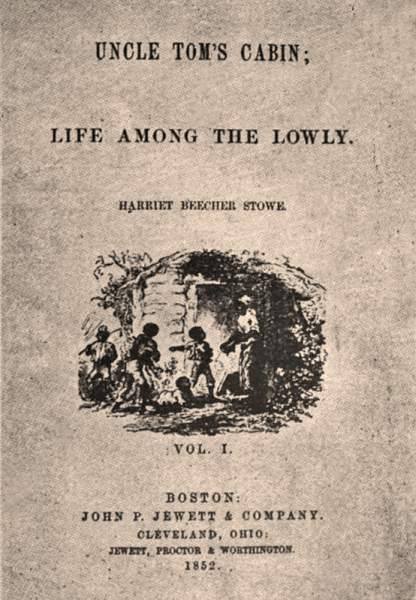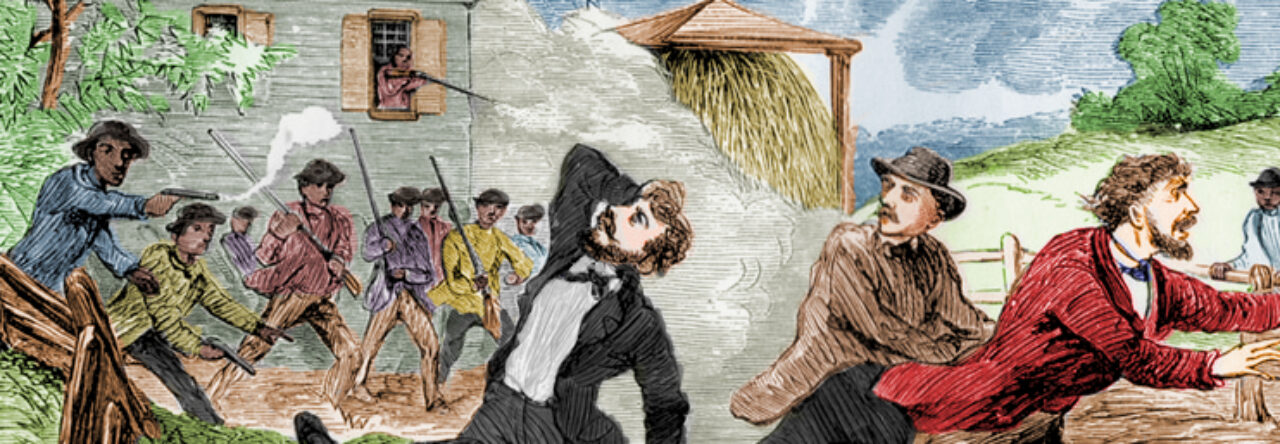Citation
Harriet Beecher Stowe, Uncle Tom’s Cabin, Or Life Among the Lowly (Cleveland, OH: Jewett, 1852), FULL TEXT via Project Gutenberg
Excerpt

Uncle Tom’s Cabin (House Divided Project)
A thousand lives seemed to be concentrated in that one moment to Eliza. Her room opened by a side door to the river. She caught her child, and sprang down the steps towards it. The trader caught a full glimpse of her just as she was disappearing down the bank; and throwing himself from his horse, and calling loudly on Sam and Andy, he was after her like a hound after a deer. In that dizzy moment her feet to her scarce seemed to touch the ground, and a moment brought her to the water’s edge. Right on behind they came; and, nerved with strength such as God gives only to the desperate, with one wild cry and flying leap, she vaulted sheer over the turbid current by the shore, on to the raft of ice beyond. It was a desperate leap—impossible to anything but madness and despair; and Haley, Sam, and Andy, instinctively cried out, and lifted up their hands, as she did it.
The huge green fragment of ice on which she alighted pitched and creaked as her weight came on it, but she staid there not a moment. With wild cries and desperate energy she leaped to another and still another cake; stumbling—leaping—slipping—springing upwards again! Her shoes are gone—her stockings cut from her feet—while blood marked every step; but she saw nothing, felt nothing, till dimly, as in a dream, she saw the Ohio side, and a man helping her up the bank.
“Yer a brave gal, now, whoever ye ar!” said the man, with an oath.
Eliza recognized the voice and face for a man who owned a farm not far from her old home.
“O, Mr. Symmes!—save me—do save me—do hide me!” said Elia.
“Why, what’s this?” said the man. “Why, if ’tan’t Shelby’s gal!”
“My child!—this boy!—he’d sold him! There is his Mas’r,” said she, pointing to the Kentucky shore. “O, Mr. Symmes, you’ve got a little boy!”
“So I have,” said the man, as he roughly, but kindly, drew her up the steep bank. “Besides, you’re a right brave gal. I like grit, wherever I see it.”
When they had gained the top of the bank, the man paused.
“I’d be glad to do something for ye,” said he; “but then there’s nowhar I could take ye. The best I can do is to tell ye to go thar,” said he, pointing to a large white house which stood by itself, off the main street of the village. “Go thar; they’re kind folks. Thar’s no kind o’ danger but they’ll help you,—they’re up to all that sort o’ thing.”
“The Lord bless you!” said Eliza, earnestly.
Related Sources
- “Little Topsy’s Song,” sheet music cover, 1853
- Frances Watkins Harper to William Still, October 20, 1854
